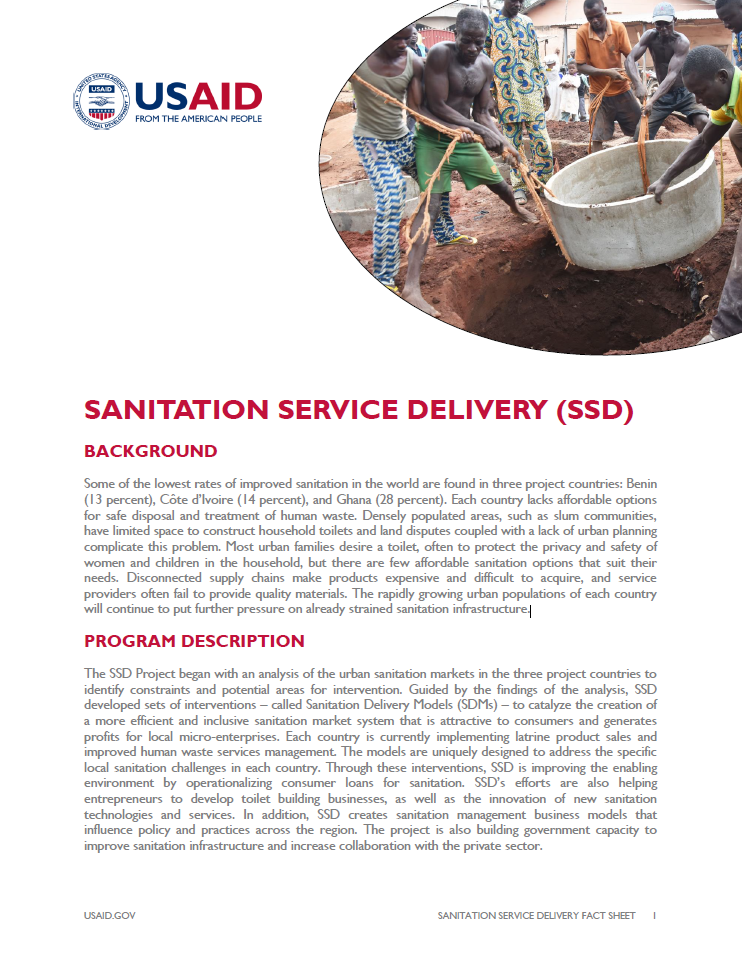Speeches Shim
Sanitation Service Delivery (SSD) ![]() (pdf - 373k)
(pdf - 373k)
BACKGROUND
Some of the lowest rates of improved sanitation in the world are found in three project countries: Benin (13 percent), Côte d’Ivoire (14 percent), and Ghana (28 percent). Each country lacks affordable options for safe disposal and treatment of human waste. Densely populated areas, such as slum communities, have limited space to construct household toilets and land disputes coupled with a lack of urban planning complicate this problem. Most urban families desire a toilet, often to protect the privacy and safety of women and children in the household, but there are few affordable sanitation options that suit their needs. Disconnected supply chains make products expensive and difficult to acquire, and service providers often fail to provide quality materials. The rapidly growing urban populations of each country will continue to put further pressure on already strained sanitation infrastructure.
PROGRAM DESCRIPTION
SSD Project began with an analysis of the urban sanitation markets in the three project countries to identify constraints and potential areas for intervention. Guided by the findings of the analysis, SSD developed sets of interventions – called Sanitation Delivery Models (SDMs) – to catalyze the creation of a more efficient and inclusive sanitation market system that is attractive to consumers and generates profits for local micro-enterprises. Each country is currently implementing latrine product sales and improved human waste services management. The models are uniquely designed to address the specific local sanitation challenges in each country. Through these interventions, SSD is improving the enabling environment by operationalizing consumer loans for sanitation. SSD’s efforts are also helping entrepreneurs to develop toilet building businesses, as well as the innovation of new sanitation technologies and services. In addition, SSD creates sanitation management business models that influence policy and practices across the region. The project is also building government capacity to improve sanitation infrastructure and increase collaboration with the private sector.
OBJECTIVES
- Increase access to improved sanitation.
- Increase safe containment and transport of human waste.
- Share learning on market-based approaches to the provision of sanitation services throughout West Africa.
EXPECTED RESULTS
- 86,468 people gain access to basic sanitation and a further 233,347 people gain access to improved sanitation.
- 527,902 people gain access to safe human waste management.
- 25% of those gaining access to basic sanitation and safe management of fecal waste are in the two lowest poverty quintiles.
- Dissemination of learning on market-based approaches to the provision of sanitation services throughout West Africa.
PROGRAM ACHIEVEMENTS
- 1798 toilet products sold to date (July 2018)
- Introducing new sanitation products and constructions technologies;
- Training artisans and helping business start-ups;
- Designing sales strategies and training sales agents;
- Organizing public awareness events;
- Conducting community marketing.
- 437 septic tank emptying services provided through the Call Centers to improve the quality and reduce the cost of mechanized emptying of septic tanks (as of July 2018).
- Successfully testing a Mobile Money solution to reduce the cost of operations and increase profitability.
- Establishing finance mechanisms and guarantee funds for support of landlords and entrepreneurs that are willing to access loans for toilet construction with over $70,000 USD of micro-loans issued to households for the construction of 250 toilets.
PROGRAM INFORMATION
GOAL
Influence the region’s sanitation sector to create a more effective, sustainable and inclusive sanitation market for the urban poor by developing and testing scalable interventions that engage private sector service providers, and by contributing to the creation of a strong enabling environment for sanitation.
LIFE OF PROGRAM
Five Years: 2014 – 2019
TOTAL USAID FUNDING
U.S. $15.8 million
GEOGRAPHIC FOCUS
Benin, Côte d’Ivoire, Ghana
IMPLEMENTING PARTNERS:
- Population Services International (PSI), lead implementing partner, with:
- Water and Sanitation for the Urban Poor (WSUP)
- Program for Appropriate Technology in Health (PATH)


Comment
Make a general inquiry or suggest an improvement.